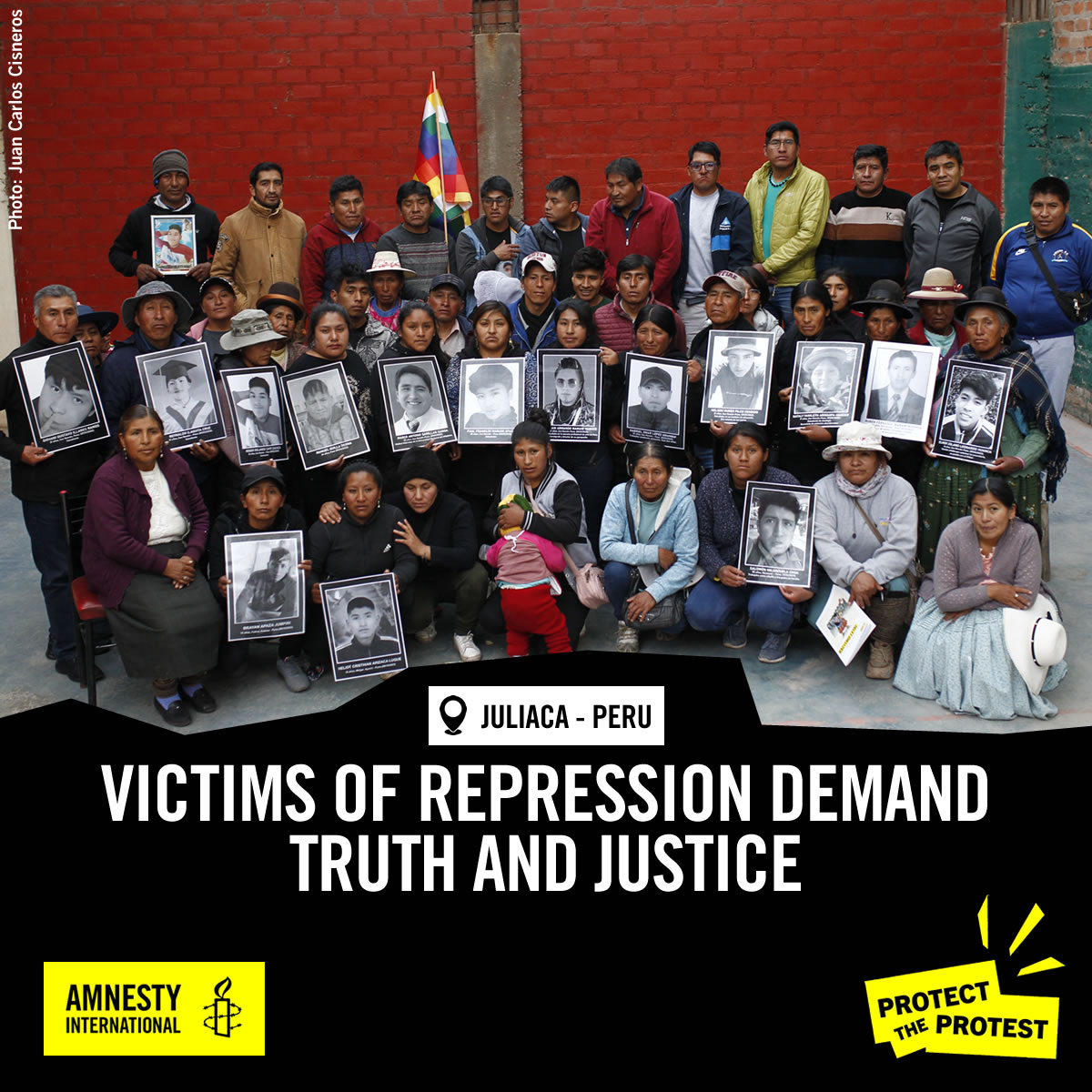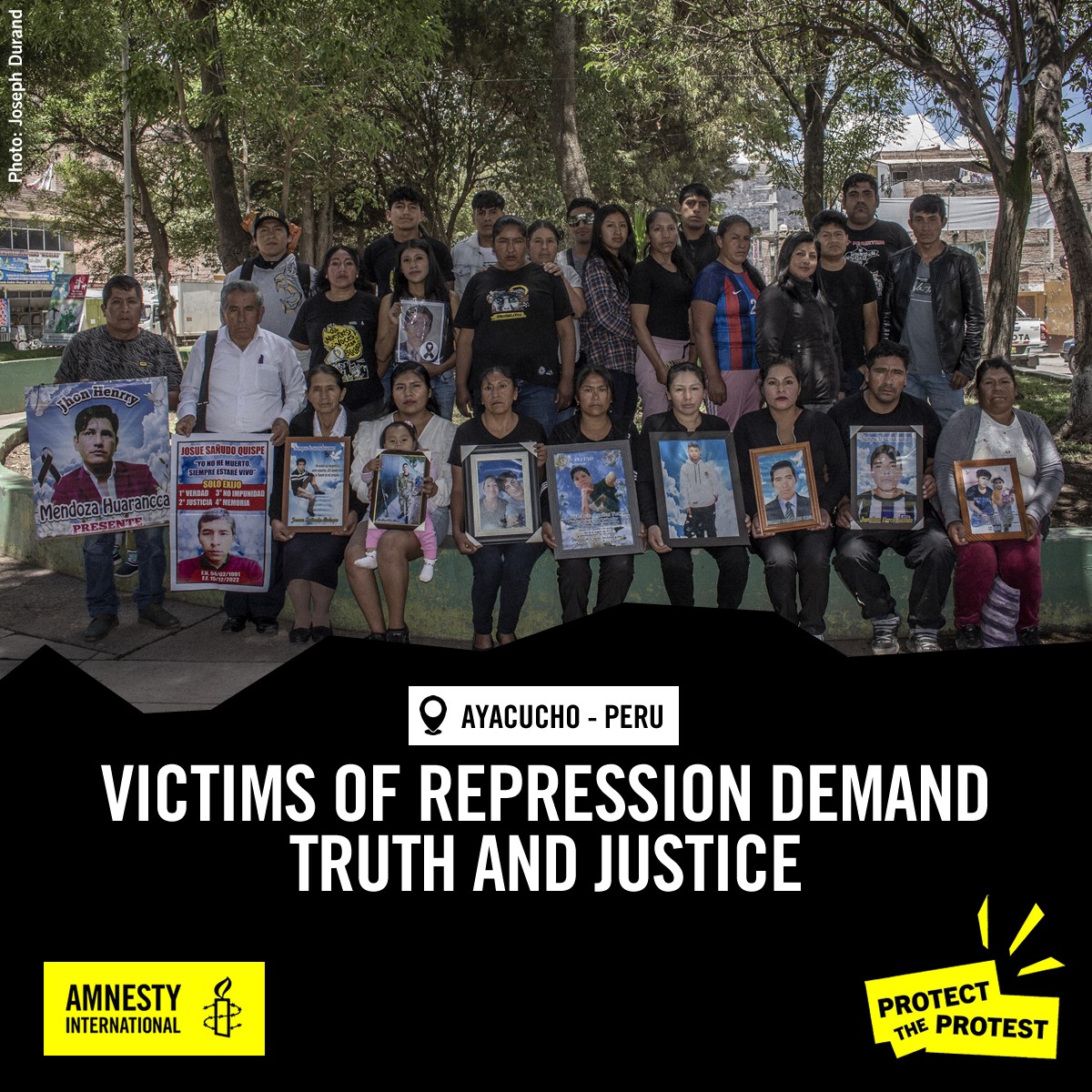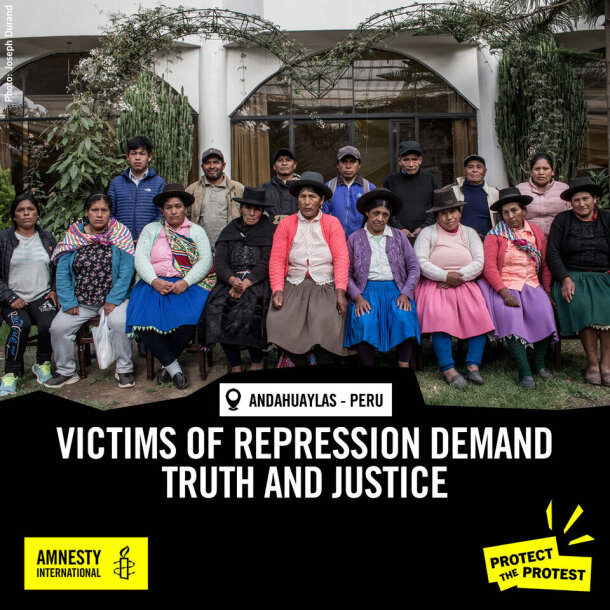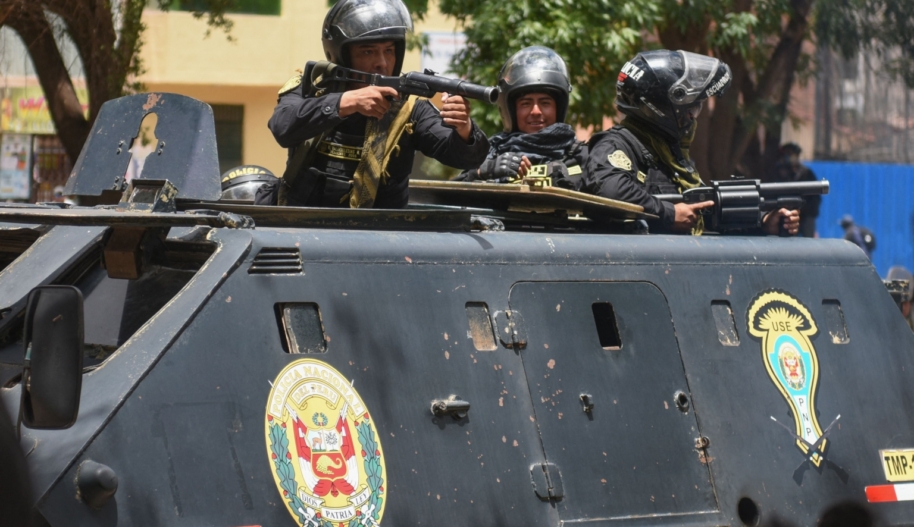Authorities must redouble their efforts to secure truth, justice, and reparation for all the victims of one of the gravest episodes of widespread human rights violations in Peru’s recent history, said Amnesty International 12 months on from the beginning of a wave of protests that erupted across the nation, resulting in the killing of 49 civilians and more than a thousand wounded during a military and police crackdown.

On 27 November, Peru’s Attorney General Patricia Benavides presented a constitutional complaint against President Dina Boluarte and several cabinet ministers, a few hours after prosecutors accused the very same Attorney General of directing a criminal network of corruption. The Attorney General’s constitutional complaint is part of the first stage of a process before Peru’s Congress that would seek to strip the president and ministers of immunity in order to face criminal charges. The constitutional complaint before the Congress took a small portion of the information from a much larger ongoing criminal investigation against the president, which remains in the hands of staff in the Peru’s Public Prosecutor’s office and must be expedited without delay.
Constitutional complaint follows launch of probes into lethal repression of Peru protests
Before the presentation of the constitutional complaint, the public prosecutor’s office had opened a series of investigations in December 2022 and January 2023. One line of investigation is looking into the command responsibility of seven senior officials, including President Dina Boluarte, cabinet ministers and police and military commanders. Another line of investigation is held by the Special Team of Prosecutors for Victims of Social Protests – established in March 2023 – and concerns the police and military operations carried out in the different regions of the country.
Prosecutors must do everything in their power to get to the bottom of this and guarantee the rights of those affected to truth, justice, and reparation.
Ana Piquer, Americas director at Amnesty International
“Notwithstanding the constitutional complaint presented by the Attorney General before Congress in recent days, the other criminal investigations underway must be strengthened. Although public prosecutors have made some progress in their investigations regarding people killed or wounded in protests, including interrogating senior public servants, police, and the military, they must dig deeper. Evidence has emerged pointing to the possible criminal responsibility of commanders or other superiors. Prosecutors must do everything in their power to get to the bottom of this and guarantee the rights of those affected to truth, justice, and reparation,” said Ana Piquer, Americas director at Amnesty International.

Amnesty International documented 25 of the 49 people killed during protests between December 2022 and February 2023 and found that at least 20 could be considered extrajudicial executions, a crime under international law, and that all of them should be investigated as such. Prior to the presentation of the constitutional complaint of 27 November, no public official had been formally accused. The complaint names four police officers and one member of the army, apparently of medium and lower ranks in the chain of command. Nevertheless, no public servant has been arrested, even though the criminal files on the deaths include the names of the commanders in charge of the operations, and the names of the units, police and military personnel officers involved in the repression. Moreover, several public officials, in publicly reported statements to prosecutors, pointed out that the president and cabinet ministers were informed of the operations.
Each day that passes increases the indignation of those who live with serious injuries or with the pain of having lost their loved ones. Peru and the world must know the truth before it is too late.
Marina Navarro, Executive Director of Amnesty International Peru
Regarding the first line of investigation into the command responsibility of seven senior officials, Amnesty International analyzed official documents and interviewed lawyers representing the victims, as well as interviewing the prosecutors working on the case. According to the information available to the organization, even though prosecutors have questioned senior officials, they seem to have failed to join the dots linking key pieces of evidence. On the one hand, according to information held by the office of the prosecutor but publicly reported, the president had declared to prosecutors that she was unaware of the unfolding police and military actions in response to protests and that it was not her role to get involved in them. Yet the Peruvian Constitution states that the president is “the Commander in Chief of the armed forces and the Peruvian National Police.” In addition, according to public reports, both the head of the armed forces and the former Minister of the Interior have declared before prosecutors that the president was constantly briefed in person on the situation unfolding during the protests. According to the Inter-American Court of Human Rights, command responsibility relates to evidence that the authorities knew or should have known that the acts were occurring, as well as their failure to take steps to prevent and/or to punish acts that could result in human rights violations.

In an official letter from the head of the armed forces dated 20 January 2023 and analyzed by Amnesty International, the armed forces responded to a request from the public prosecutor. The request asks for records of any official correspondence received by the head of the armed forces from the president, the Minister of Defense or the head of the Council of Ministers during the operations in Andahuaylas from 10 to 12 December 2022, Ayacucho on 15 December 2022 and Juliaca on 9 January 2023. In its response, the head of the armed forces replied that his institution had no record of any official communication from any of these senior officials. The absence of such communication, if not refuted by other strong evidence, could be an indicator that the president and other senior officials did not take requisite action to avoid human rights violations.
Furthermore, in a statement to prosecutors of 23 January, the former Minister of Defense and current head of the Council of Ministers claimed that he forwarded to the head of the armed forces a WhatsApp message from the president, calling for operations in response to protests to ensure no loss of human life. Nevertheless, the only evidence of this WhatsApp message in the criminal file appears to be in a screenshot of a message that may have been sent to the head of the armed forces on Sunday 18 December, three full days after the events in Ayacucho in which the army used live ammunition, resulting in the deaths of 10 civilians. This suggests there could be no actual evidence that the president intervened to avoid the tragic deaths in Ayacucho.
Key pieces of evidence may not have been investigated properly
The elements above suggest the public prosecutor assigned to the investigation of senior officials may have neglected to carry out investigative tasks to analyze these key pieces of evidence that could point to a failure to act by any superiors who may have had the responsibility to take all necessary and reasonable measures within their power to prevent or repress the commission of human rights violations or to submit the matter to the competent authorities for investigation and prosecution.
In addition, according to the information available to Amnesty International, investigators may not have taken the initiative to request a warrant to analyze telephone records of senior officials during the protests.
Moreover, according to his declaration before prosecutors reported in press, a police officer in June 2023 appears to have testified that he received verbal orders to use live ammunition in the operation in Juliaca on 9 January that resulted in the death of 18 civilians, and that he was told these orders came from the president. Prosecutors may have failed to follow up this line of investigation or call the officer back for further questioning. According to evidence collected by Amnesty International, police and the military made use of live ammunition to respond to protests, a measure considered unlawful under the international standards regarding control of demonstrations.
In the second line of investigation, the Special Team of Prosecutors for Victims of Social Protests, established inside the Attorney General’s office and based in the capital Lima, has advanced throughout the year with a team that has grown to 41 prosecutors of different ranks, assigned for different regions where protests occurred. Although this Special Team has made important progress, serious inadequacies remain. In the six months since case files were transferred to this Special Team in Lima, prosecutors only carried out a handful of site visits to the crime scenes in each city. In the case of the city of Andahuaylas, where police operations resulted in five civilians killed on 11 and 12 December, prosecutors may have only visited the city twice in six months. Lawyers of affected families informed Amnesty International that the prosecutor’s office carried out its first visit to Andahuaylas airport, a site of police repression, eight months after the deaths occurred. This also happened in the city of Juliaca, in the region of Puno, where 18 people lost their lives during police repression of protests on 9 January 2023. Families and their lawyers reported that prosecutors did not carry out a proper site inspection at Juliaca airport until October. When the Special Team was created, the objective was for its staff to carry out regular fieldwork, according to information provided by the Special Team to Amnesty International. However, a representative of the Special Team told Amnesty International they had only carried out three or four site visits to the Puno region in six months.
In addition to delays in the investigations, the internal organization of the Special Team has undermined the progress of the enquiry and affected victims and families’ access to justice. Prosecutors and staff in the Special Team have been rotated on several occasions, negatively affecting follow-up on the cases and contact with victims’ legal representatives. Victims and families have also denounced obstacles to giving their declarations over online videocalls, due to the limited internet access in rural areas, as well as problems in ensuring interpretation into Indigenous languages. Such problems are not restricted to the work of the Special Team; lawyers representing victims in the case against the president and other senior officials told Amnesty International that the scheduling of hearings in Lima has been chaotic, at times requiring family members to travel to the capital at enormous expense on long bus journeys, only for proceedings to be cancelled on the day of the hearing.
The army and police have continued to fail to cooperate with the prosecutor’s office, resulting in obstacles that investigators have yet to overcome. Records on weapons and ammunition remain incomplete, in part due to failures by the prosecutor’s office to seize arms and ballistic evidence promptly after the events occurred, but also due to the lack of cooperation by the military and police. The head of the armed forces told Amnesty International in an interview that the rifles the army used in Ayacucho on 15 December were collected, packaged and handed over to the public prosecutor in January. Yet the Special Team responsible for investigating the events in Ayacucho told Amnesty International that the prosecutor’s office did not receive any weapons or even request them to be delivered.
‘Peru and the world must know the truth before it is too late’
The Peruvian National Police (PNP) also provided incomplete and patchy records on the weapons and ammunition used during operations to the prosecutor. Amnesty International submitted three public information requests to Peru’s police asking for more precise information on the arms and ammunition used during protests, but the police failed to fully comply with these requests. In September, Amnesty International interviewed PNP representatives who were again unable to provide complete details.
Finally, the coordination between public prosecutors in different areas of the Attorney General’s office appears deficient, meaning that important pieces of evidence may have been analyzed by one section of the investigation without this being shared with other areas of the same institution to advance to common goal of uncovering the truth. Under Peru’s Criminal Procedural Code, the Special Team prosecutors must conclude the preliminary phase of their investigations during April and May 2024, while the prosecutors investigating the president had a deadline for June. These dates represent the deadlines for prosecutors to be able to present formal charges, advance to a second phase of investigation and move towards an eventual criminal trial before a judge.
“The state of the investigations into deaths in protests is extremely concerning, with some of the most basic tasks not yet completed. For instance, several family members and witnesses have still not been interviewed, and in some cases even fundamental evidence such as autopsies were only recently completed,” said Marina Navarro, executive director of Amnesty International Peru. “In the current context, it is imperative that prompt, thorough and impartial investigations are ensured. Investigations must not be shelved because they ignored or omitted key evidence. Each day that passes increases the indignation of those who live with serious injuries or with the pain of having lost their loved ones. Peru and the world must know the truth before it is too late.”
Header photo credit: ERNESTO BENAVIDES/AFP via Getty Images













